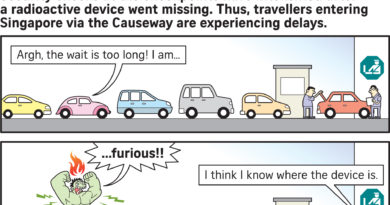SCI-TEC ENVIRONMENT: KUALA LUMPUR- Businesses want heftier penalties for water polluters
Pix for representational purpose only.
.
.

IN a state where the mere mention of water rationing is enough to give consumers nightmares, water disruptions are causing losses amounting to millions of ringgit a day to industries that use a lot of the life-sustaining liquid.
For this reason, industry players are calling for hefty penalties, including mandatory imprisonment, for those responsible for contamination that causes water treatment plants to shut down, resulting in unscheduled water cuts.
They also want courts to force water polluters to compensate manufacturers and businesses for their losses.
Commenting on the latest water cut that affected some 1.2 million account holders in the Klang Valley after four Sungai Selangor water treatment plants were forced to shut down due to industrial effluent pollution, Malaysian Employers Federation (MEF) said it supports calls for an increase in penalties to serve as a deterrent to polluters.
MEF executive director Datuk Shamsuddin Bardan told Nanyang Siang Pau in its report yesterday that in previous cases, companies responsible for industrial effluent pollution were only fined.
“The authorities concerned should view the matter more seriously now.”
“Factories which suffer losses as a result of water cuts should be compensated. The authorities can consider pressing for heftier fines and compensation in courts.”
Shamsuddin also reminded companies or factories to treat their effluents properly to protect water sources.
SME Association of Malaysia president Datuk Michael Kang Hua Keong proposed not only increasing fines but also including a jail term for those found guilty of polluting water sources.


.
He said some factories had to stop production due to the water cut.
“For factories like those involved in food processing that need a large amount of water, the stoppage of production lines means spoilage of raw materials and a drop in production capacity.”
Federation of Malaysian Manufacturers Selangor branch chairman Jacob Lee Chor Kok said in the latest water cut, he received “an SOS” from a member seeking the immediate delivery of two tanker-loads of water to his factory.
He said the member, whose factory manufactures semi-conductors, claimed that previous water disruptions had caused him to lose RM3 million a day in revenue.
[]
.


.
RELATED STORY:
Call for river protection authority

PETALING JAYA: Klang MP Charles Santiago (pix) has called for a national river protection authority to be set up to safeguard the nation’s water resources.
There should be buffer zones of 300m to 400m from rivers where business activities are not allowed, he said, adding that rivers and buffer zones should be considered as national security areas.
“Police and other enforcement authorities could be used to supervise the areas with the help of CCTV and other technologies.”
Santiago said it is better to have one entity under the federal government to oversee the country’s water management as states have limited funds and manpower to enforce existing laws.
“The issue is pressing and it involves multiple factors and stakeholders,” the former National Water Services Commission chairman said.
“LUAS (Selangor Water Management Authority) is a state agency but its manpower is small and the state might not have sufficient funds for its expenses. Enforcement needs funds, too.
“There are too many agencies overseeing rivers, working in silos and not communicating with one another.”
He added raising fines under the current law would not stop offenders as companies would pay the penalty and continue their operations.
Culprits who are found committing offences related to the supply of treated water and sewerage services, can be charged under the Water Services Industry Act 2006, that carries a maximum fine of RM500,000 or a maximum of 10 years’ jail or whipping, or all three.
“Additionally, we have the climate change issue to address. More rain does not mean we’ll have more water.
“We must see how best to protect our resources. Otherwise, the water volume will dwindle. More pollution only creates a disadvantage. We have to carry the burden.
“We’ve had one too many water cuts since last year, to merely impose slap-on-the-wrist punishment.”
Climate youth activist Ahmad Izzudin Azmi concurred with Santiago and said it is time for the state and federal governments to act together to prevent river pollution.
“The public should continue to push the agenda forward as water is a precious commodity,” said Ahmad, who is secretary of the Network for Ecology and Climate.
However, environmentalist Gurmit Singh disagreed with Santiago’s proposal.
“He’s asking for the impossible. Water is very much a state issue,” he said.


SIGN UP TO RECEIVE OUR EMAIL
.
The most important news of the day about the ASEAN Countries and the world in one email: [email protected]
9.7.2020
.









